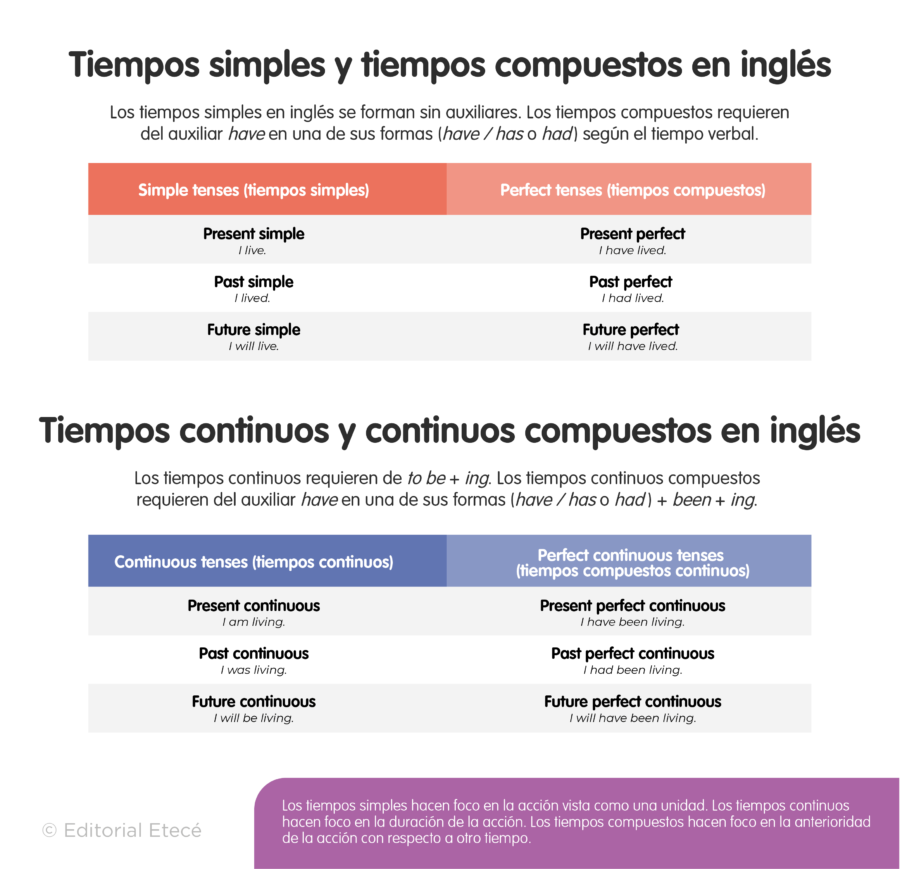Índice
El future perfect es un un tiempo verbal compuesto que se utiliza para expresar acciones que habrán sido realizadas y finalizadas antes de un momento específico en el futuro. Por ejemplo: By the year 2026 I will have finished university. / Para el año 2026 habré terminado la universidad.
Las acciones expresadas en future perfect implican situarse en un tiempo futuro y mirar hacia atrás, hacia un “pasado”, que (desde el presente) aún no sucedió. El futuro perfecto se traduce como “habré (hecho)” o “voy a haber (hecho)”. Por ejemplo: By the end of the month I will have moved. / Para fin de mes me habré mudado.
El futuro perfecto se suele utilizar en combinación con preposiciones y adverbios que expresan una fecha u hora límite. Por ejemplo: by the year 2025 (para el año 2025), before the end of the month (antes de fin de mes), by the time I get home (para cuando llegue a casa).

Estructura del future perfect
El future perfect es un tiempo verbal compuesto, es decir, que tiene auxiliares para formar la estructura positiva. Se forma con will + have (como auxiliar) + past participle.
Estructura afirmativa
| Sujeto | will have | past participle |
|---|---|---|
| I You He She It We They | will have | done |
Por ejemplo: I will have finished this job by tomorrow. / Habré terminado este trabajo para mañana.
Estructura negativa
| Sujeto | will not (won’t) have | past participle |
|---|---|---|
| I You He She It We They | won’t have | gone |
Por ejemplo: I will not have finished this job by tomorrow. / No habré terminado este trabajo para mañana.
Atención: will not se puede contraer en won’t. Por ejemplo: I won’t have finished this job by tomorrow.
Estructura interrogativa
| Will | sujeto | have + past participle |
|---|---|---|
| Will | I you he she it we they | have played? |
Por ejemplo: Will you have finished this job by tomorrow? / ¿Habrás terminado este trabajo para mañana?
Atención: Existe el future perfect continuous, que se utiliza para enfatizar la duración de una acción que habrá estado en progreso hasta un momento específico en el futuro. Por ejemplo: Next year my father will have been working for the same company for 20 years. / El año que viene mi padre habrá estado trabajando para la misma compañía durante 20 años.
Otros tiempos futuros
Existen varios tiempos verbales que expresan futuro en inglés. La diferencia entre ellos está relacionada con el contexto y lo que quiere expresar el hablante:
| Tiempo verbal futuro | Explicación | Ejemplo |
|---|---|---|
| Future simple | Expresa futuro sin otra intención o color. | I’ll sit for the test on August 28. |
| Future continuous | Expresa una acción en progreso en una fecha futura. | I’ll be sitting for the test at 10 a.m. on August 28. |
| Future perfect | Expresa que una acción habrá sido realizada para determinada fecha futura. | I will have sat for the test by the end of the month. |
Oraciones en future perfect en inglés
- I will have come backby the time you arrive.
Habré regresado para cuando llegues. - Alice will have graduated by the time she’s twenty five.
Karen se habrá graduado para cuando tenga veinticinco años. - They will have left by tomorrow.
Se habrán ido para mañana. - The cake will have cooled by the time our friends come over.
El pastel se habrá enfriado para cuando lleguen nuestros amigos. - The detective will have solved the crime by the end of the episode.
El detective habrá resuelto el crimen para el final del episodio. - Will you have finished the book by Monday?
¿Habrás terminado el libro para el lunes? - He will have understood by then.
Él habrá entendido para entonces. - In a few years’ time he will have forgotten everything that happened today.
En unos años, él se habrá olvidado de todo lo que sucedió hoy. - This time next year you will have visited every important monument in the city.
Para esta época el año próximo habrás visitado cada monumento importante de la ciudad. - With this rain, I will have caught a cold by the time I get home.
Con esta lluvia, me habré resfriado para cuando llegue a casa. - If you come back next Friday, we will have finished the renovation.
Si regresas el próximo viernes, habremos terminado la restauración. - We will have lived in this house for three years in June.
En junio habremos vivido en esta casa durante tres años. - The cold will have kept the vegetables fresh.
El frío habrá conservado frescos los vegetales. - The students will have completed all their tests by September 16.
Los estudiantes habrán completado todos sus exámenes para el 16 de septiembre. - We will have come up with a solution by tomorrow.
Habremos pensado en una solución para mañana. - Will you have come back by the time I wake up?
¿Habrás regresado para cuando despierte? - They will have built the dam by 2030.
Habrán construido la represa para 2030. - Sylvia and Mel will have gotten married by the end of the year.
Sylvia y Mel se habrán casado para fin de año. - The dispute between the company departments will have blown over by the end of the quarter.
La disputa entre los departamentos de la compañía se habrá olvidado para el final del trimestre. - They will have looted the town by the end of the day.
Habrán saqueado el pueblo para el final del día. - I will have explained everything before the teacher gets here.
Habré explicado todo antes de que llegue la maestra. - It will have stopped raining by the afternoon.
Habrá dejado de llover para la tarde. - He will have planned everything before the trip.
Habrá planificado todo antes del viaje. - Next week I will have finished the book.
La semana próxima voy a haber terminado el libro. - He will have thought of another excuse for the next meeting.
Habrá pensado en otra excusa para la próxima reunión. - Scientists will have discovered a cure for the disease before the next decade.
Los científicos habrán descubierto una cura para la enfermedad antes de la próxima década. - Next time you see him he will have reconsidered his position.
La próxima vez que lo veas habrá reconsiderado su posición. - I will not have forgotten you even in 10 years’ time.
No te habré olvidado ni en 10 años. - The jewelry will have been stolen by the time the police arrive.
Las joyas habrán sido robadas para cuando llegue la policía. - We will have made all the necessary arrangements by the end of the week.
Habremos terminado todos los preparativos necesarios para el final de la semana.
El past participle
El past participle (tercera columna de los verbos) es una forma no conjugada que sirve para formar los perfect tenses en inglés: el present perfect, el past perfect y el future perfect.
El past participle de los verbos regulares se forma agregando la terminación –ed al infinitivo del verbo.
Por ejemplo: like – liked; work – worked; wash – washed.
Los verbos irregulares no siguen reglas para formar el past participle:
| Verbo infinitivo | Past participle | Tradicción |
|---|---|---|
| be | been | estado |
| become | become | convertido en |
| begin | begun | comenzado |
| blow | blown | soplado |
| bite | bitten | mordido |
| break | broken | roto |
| bring | brought | traído, llevado consigo |
| buy | bought | comprado |
| catch | caught | agarrado, tomado |
| choose | chosen | elegido |
| come | come | venido |
| cost | cost | costado |
| do | done | hecho |
| drink | drunk | bebido |
| drive | driven | conducido |
| eat | eaten | comido |
| find | found | encontrado |
| forbid | forbidden | prohibido |
| forget | forgotten | olvidado |
| get | gotten | conseguido |
| give | given | dado |
| go | gone | ido |
| have | had | tenido |
| hear | heard | oído |
| hit | hit | golpeado |
| hurt | hurt | lastimado |
| keep | kept | mantenido |
| know | knew | sabido, conocido |
| learn | learnt o learned (regular) | aprendido |
| leave | left | salido, dejado, abandonado |
| lend | lent | prestado |
| lose | lost | perdido |
| make | made | hecho |
| meet | met | reunido, encontrado |
| pay | paid | pagado |
| read | read | leído |
| put | put | puesto |
| rise | risen | subido |
| run | run | correr |
| say | said | dicho |
| see | seen | visto |
| send | sent | enviado |
| sit | sat | sentado |
| steal | stolen | robado |
| take | taken | tomado |
| understand | understood | entendido |
| wake | woken | despertado |
| wear | worn | vestido, usado |
| win | won | ganado |
| write | written | escrito |

Sigue con:
- Oraciones con «will» y «won’t»
- Oraciones con «will» y «going to»
- Oraciones en pasado perfecto inglés
- Oraciones en presente perfecto inglés





¿Te fue útil esta información?
Sí No¡Genial! gracias por visitarnos :)